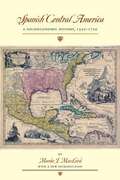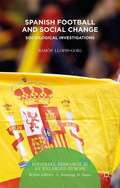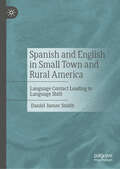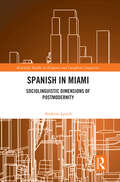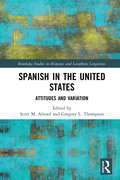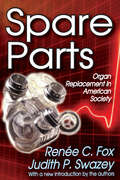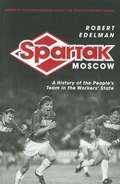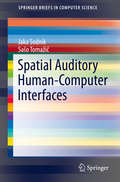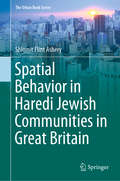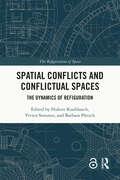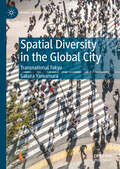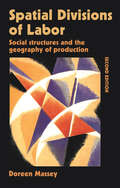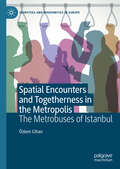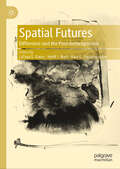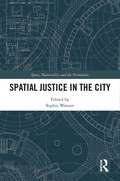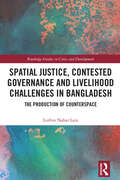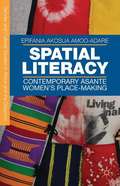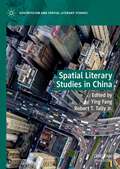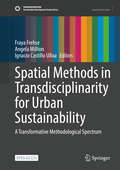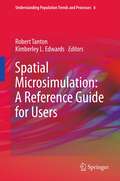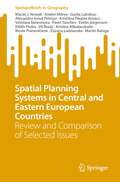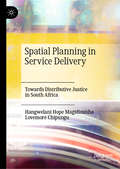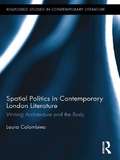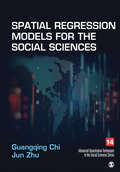- Table View
- List View
Spanish Central America: A Socioeconomic History, 1520-1720
by Murdo J. MacleodThe seventeenth century has been characterized as "Latin America's forgotten century. " This landmark work, originally published in 1973, attempted to fill the vacuum in knowledge by providing an account of the first great colonial cycle in Spanish Central America. The colonial Spanish society of the sixteenth century was very different from that described in the eighteenth century. What happened in the Latin American colonies between the first conquests, the seizure of long-accumulated Indian wealth, the first silver booms, and the period of modern raw material supply? How did Latin America move from one stage to the other? What were these intermediate economic stages, and what effect did they have on the peoples living in Latin America? These questions continue to resonate in Latin American studies today, making this updated edition of Murdo J. MacLeod's original work more relevant than ever. Colonial Central America was a large, populous, and always strategically significant stretch of land. With the Yucatán, it was home of the Maya, one of the great pre-Columbian cultures. MacLeod examines the long-term process it underwent of relative prosperity, depression, and then recovery, citing comparative sources on Europe to describe Central America's great economic, demographic, and social cycles. With an updated historiographical and bibliographical introduction, this fascinating study should appeal to historians, anthropologists, and all who are interested in the colonial experience of Latin America.
Spanish Football and Social Change
by Ramón Llopis-GoigIn the past few decades, Spanish football has undergone a significant transformation, both on and off the pitch. While impressive victories in international tournaments have moved the national team beyond its traditional weaknesses, there has been a rise of violent groups, vandalism and outbreaks of racism and xenophobia in the stadiums. Llopis-Goig analyses these trends, questioning the role of football in contemporary Spanish culture and the historical reasons for its social hegemony. From the transformation of the football clubs into companies and the hyperconsumption of football to the origin and evolution of the Spanish Fury and mechanisms for reproducing hegemonic masculinity, Spanish Football and Social Change explores the main traits of Spanish football culture from a sociological perspective. Fans views of these changes are examined throughout, as are the influences of regional and national identities. Providing an in-depth sociological analysis of football's impact on Spanish society, this book will appeal to Sociologists, Historians and anyone with an interest in football.
Spanish Peru 1532-1560: A Social History
by James LockhartWhen "Spanish Peru, 1532-1560" was published in 1968, it was acclaimed as an innovative study of the early Spanish presence in Peru. It has since become a classic of the literature in Spanish American social history, important in helping to introduce career-pattern history to the field and notable for its broad yet intimate picture of the functioning of an entire society. In this second edition, James Lockhart provides a new conclusion and preface, updated terminology, and additional footnotes.
Spanish and English in Small Town and Rural America: Language Contact Leading to Language Shift
by Daniel James SmithThis book examines Spanish English bilingual patterns in a small town and rural Northeast Georgia community of Hispanics recently immigrated from Mexico and other areas of Latin America. Speech data from naturally-occurring conversations by 56 children and adults of both sexes are analyzed within Myers-Scotton’s Matrix Language Frame (MLF) model. Eight language patterns are identified, including monolingual Spanish and English turns, codeswitched turns, and turns showing convergence (morphemes/words from one language with grammatical structure from the other). Tokens of each type (per sentence or short conversational turn) were counted per informant. Analysis reveals that percentages of monolingual and codeswitched utterances pattern in relation to percentages of utterances showing convergence, indicating that informants’ Spanish does not begin to converge toward English until fewer than 70% of their utterances are monolingual Spanish and that both codeswitching and convergence are mechanisms of language shift from dominance in one language to another. Several associated social factors of the informants, including age, gender, and country of origin, expand understanding of the linguistic and shift patterns. The percentages of the different language types also indicate abrupt shifts from predominance of one language type to another. This 'snapshot' of a language shift in process and the abruptness of the shifts in stages is the unique observation of this study that has not been reported by other language contact researchers. The book also addresses the simultaneous acquisition of Spanish and English by young children and implications for education. The book will be of interest to students, teachers, and researchers of linguistics, sociolinguistics, bilingual education, and Spanish English contact specifically.
Spanish in Miami: Sociolinguistic Dimensions of Postmodernity (Routledge Studies in Hispanic and Lusophone Linguistics)
by Andrew LynchSpanish in Miami reveals the multifaceted ways in which the language is ideologically rescaled and sociolinguistically reconfigured in this global city. This book approaches Miami’s sociolinguistic situation from language ideological and critical cultural perspectives, combining extensive survey data with two decades of observations, interviews, and conversations with Spanish speakers from all sectors of the city. Tracing the advent of postmodernity in sociolinguistic terms, separate chapters analyze the changing ideological representation of Spanish in mass media during the late 20th century, its paradoxical (dis)continuity in the city’s social life, the political and economic dimensions of the Miami/Havana divide, the boundaries of language through the perceptual lens of Anglicisms, and the potential of South Florida—as part of the Caribbean—to inform our understanding of the highly complex present and future of Spanish in the United States. Spanish in Miami will be of interest to advanced students and researchers of Spanish, Sociolinguistics, and Latino Studies.
Spanish in the United States: Attitudes and Variation (Routledge Studies in Hispanic and Lusophone Linguistics)
by Scott M. Alvord Gregory L. ThompsonSpanish in the United States: Attitudes and Variation is a collection of new, cutting-edge research with the purpose of providing scholars interested in Spanish as it is spoken by bilinguals living in the United States a current view of the state of the discipline. This volume is broad and inclusive of the populations studied, methodologies used, and approaches to the linguistic study of Spanish in order to provide scholars with an up-to-date understanding of the complexities of the Spanish(es) spoken in the United States. In addition to this snapshot, this volume stimulates new areas of inquiry and motivates new ways of analyzing the social, linguistic, and educational aspects of what it means to speak Spanish in the United States.
Spare Parts: Organ Replacement in American Society
by Renee C. FoxSpare Parts examines major developments in the field of organ replacement that occurred in the United States over the course of the 1980s and the beginning of the 1990s. It focuses upon significant medical and social changes in the transplantation of human organs and on the development and clinical testing of the Jarvik-7 artificial heart, with special emphasis on how these biomedical events were related to the political, economic, and social climate of American society.Part I examines the important biomedical advances and events in organ transplantation and their social and cultural concomitants. In Part II, the focus shifts to the story of the rise and fall of the Jarvik-7 artificial heart in the United States, its relation to American social institutions and cultural patterns, and its bearing on social control issues associated with therapeutic innovation and the patient-oriented clinical research it entails. Part III is a personal conclusion, which explains why the authors left the field of organ transplantation after so many years.Spare Parts is written in a narrative, ethnographic style, with thickly descriptive, verbatim, and atmospheric detail. The primary data it is based upon includes qualitative materials, collected via participant observation, interviews in a variety of medical milieu, and content analysis of medical journals, newspapers, and magazine articles, and a number of television transcripts. The new introduction provides an overview of some of the recent developments in transplantation and also underscores how tenacious many of the patterns associated with organ replacement have been. Spare Parts should be read by all medical professionals, sociologists, and historians.
Spartak Moscow
by Robert EdelmanIn the informative, entertaining, and generously illustrated Spartak Moscow, a book that will be cheered by soccer fans worldwide, Robert Edelman finds in the stands and on the pitch keys to understanding everyday life under Stalin, Khrushchev, and their successors. Millions attended matches and obsessed about their favorite club, and their rowdiness on game day stood out as a moment of relative freedom in a society that championed conformity. This was particularly the case for the supporters of Spartak, which emerged from the rough proletarian Presnia district of Moscow and spent much of its history in fierce rivalry with Dinamo, the team of the secret police. To cheer for Spartak, Edelman shows, was a small and safe way of saying "no" to the fears and absurdities of high Stalinism; to understand Spartak is to understand how soccer explains Soviet life. Champions of the Soviet Elite League twelve times and eleven-time winner of the USSR Cup, Spartak was founded and led for seven decades by the four Starostin brothers, the most visible of whom were Nikolai and Andrei. Brilliant players turned skilled entrepreneurs, they were flexible enough to constantly change their business model to accommodate the dramatic shifts in Soviet policy. Whether because of their own financial wheeling and dealing or Spartak's too frequent success against state-sponsored teams, they were arrested in 1942 and spent twelve years in the gulag. Instead of facing hard labor and likely death, they were spared the harshness of their places of exile when they were asked by local camp commandants to coach the prisoners' football teams. Returning from the camps after Stalin's death, they took back the reins of a club whose mystique as the "people's team" was only enhanced by its status as a victim of Stalinist tyranny. Edelman covers the team from its days on the wild fields of prerevolutionary Russia through the post-Soviet period. Given its history, it was hardly surprising that Spartak adjusted quickly to the new, capitalist world of postsocialist Russia, going on to win the championship of the Russian Premier League nine times, the Russian Cup three times, and the CIS Commonwealth of Independent States Cup six times. In addition to providing a fresh and authoritative history of Soviet society as seen through its obsession with the world's most popular sport, Edelman, a well-known sports commentator, also provides biographies of Spartak's leading players over the course of a century and riveting play-by-play accounts of Spartak's most important matches-including such highlights as the day in 1989 when Spartak last won the Soviet Elite League on a Valery Shmarov free kick at the ninety-second minute. Throughout, he palpably evokes what it was like to cheer for the "Red and White. "
Spatial Auditory Human-Computer Interfaces
by Jaka Sodnik Sašo TomažičThis book focuses on a special group of auditory interfaces using spatial sound for the representation of information. The addition of information on the location of a selected sound source or a group of sources shows many advantages over a mere single-channel audio. This survey explains the most important limitations of the human hearing system and the perception of spatial sound. It also includes some technical background and basic processing and programming techniques for the creation and reproduction of spatial sounds with different audio equipment. Spatial auditory interfaces have evolved significantly in the last couple of years and can be found in a variety of environments where visual communication is obstructed or completely blocked by other activities, such as walking, driving, flying, operating multimodal virtual displays, etc. An entire chapter of this survey is dedicated to the most important areas of spatial auditory displays: mobile devices and computers, virtual environments, aircrafts and vehicles, visually impaired and blind computers users, and brain-computer interfaces.
Spatial Behavior in Haredi Jewish Communities in Great Britain (The Urban Book Series)
by Shlomit Flint AsheryThis book focuses on the strict orthodox Jewish (Haredi) community, which comprises many sects whose communal identity plays a central role in everyday life and spatial organization. The research reveals and analyses powerful mechanisms of residential segregation acting at the apartment-, building- and near-neighbourhood levels. Identifying the main engines of spontaneous and organised neighbourhood change and evaluating the difficulties of liberalism dealing with non-autonomous individuals in the housing market sheds light on similar processes occurring in other city centres with diverse population groups. Highlighting the impact of various organisational levels on the spatial structure of the urban enclave, the book focuses on the internal dynamics of ethno-religious enclaves that emerge from three levels of action: (1) individuals' relationships with their own and other groups; (2) the community leadership's powers within the group and in respect of other groups; and (3) government directives and tools (e.g planning). The study examines how different levels of communal organisation are reflected in the residential patterns of four British communities: the Litvish communities of Golders Green and Gateshead, and the Hassidic communities of Stamford Hill and Canvey Island.
Spatial Conflicts and Conflictual Spaces: The Dynamics of Refiguration (The Refiguration of Space)
by Hubert Knoblauch Barbara Pfetsch Vivien SommerThis volume explores the refiguration of space as a theoretical framework, presenting empirical studies on spatial conflicts and emerging conflictual spaces across different regions and scales. It contains contributions which follow varied theoretical threads and represent different geospatial standpoints, but which relate to the thesis of the refiguration of space as a new phase after globalization.By adopting a spatial lens, the book offers insights into the dynamics of social order in the post-globalization era, examining how conflicts arise within space and how spatial dynamics shape social tensions. The chapters unpack the interplay between human aspirations and geographical limitations and use the concept of (re)figuration to underline the trans-scalar dimension of most social conflicts, which is massively expanded by digital mediatization, public communication and its refigured infrastructures. While emphasizing the empirical analysis of conflicts in space, the edited volume also seeks to identify general principles of the spatial dynamics of social conflicts. It is this "spatial logic" underlying conflictual situations that the book addresses with the term "spatial conflicts."This volume will be of interest to students and researchers in sociology, anthropology, geography, urban studies, communication studies, political science, and globalization and peace studies.
Spatial Diversity in the Global City: Transnational Tokyo (Global Diversities)
by Sakura YamamuraThis book, at the nexus of migration and urban studies, sheds new light on a long-neglected group of transmigrants and the global city of Tokyo. Using extensive empirical material on transnational migrants from above and below, it locates and better specifies spatial diversification in Tokyo and beyond. By incorporating transnational spaces into urban diversity discourses, it extends the superdiversity debate to a socio-spatial dimension and examines the configuration and processes of diversity and diversification in global cities from a socio-spatial perspective. Unique in its theoretical focus on the spatial aspect of superdiversity, the book delivers rare empirical insights into the daily socio-spatial practices of transnational financial professionals and other transmigrants. This social geographical study reveals the complex interplay between global mobility and urban transformation. It will be of particular interest to urban and migration scholars in fields such as urban sociology, social geography, and urban anthropology, offering deep engagement with debates on urban diversity and transnational spaces.
Spatial Divisions of Labor
by Doreen MasseyDebate still rages over some of the questions Doreen Massey provoked in the classic first edition of Spatial Divisions of Labor, such as the nature of theory, the importance of contingency and uniqueness, and the relationship of Marxism. This second edition addresses these controversies, and also reflects on other debates which have taken place over the last decade. It contains a new first chapter and a lengthy additional concluding essay in which Massey takes up the issues of the book's relation to Marxism, its position on explanation, its argument about the conceptualization of social space and its relation to gender and feminism.
Spatial Encounters and Togetherness in the Metropolis: The Metrobuses of Istanbul (Identities and Modernities in Europe)
by Özlem CihanThis book analyzes Istanbul's bus rapid transit, the metrobus, as an encountering space to unfold the perception and practice of togetherness. Based on field research with regular metrobus passengers, the book presents a layered analysis between everyday life, everyday mobility, and togetherness to emphasize the metropolitan impact on the socio-spatial experience and subjectification. By articulating Lefebvrian social space in a metropolitan context, the book discusses that Istanbul's spatially and temporally framed everydayness leads inhabitants to the need for bus rapid transit. On the other hand, the need for the metrobus produces transit modes of experience in regulars' socio-spatial relation and subjectification. As a result, encountering and being with the unfamiliar and diverse others undertake the framed typologies of the first two layers and produce a dissolving essence in the idea and practice of togetherness in Istanbul.
Spatial Futures: Difference and the Post-Anthropocene
by Heidi J. Nast Alex G. Papadopoulos LaToya E. EavesSpatial Futures invites readers to imagine power and freedom through the lens of the ‘Black Outdoors’, a transdisciplinary spatial concept that operates beyond the planetary, stratigraphic confines of the ‘Anthropocene’. The chapters collectively point to the ontological-epistemological contradictions involved in forging liberatory spatial futures. Bringing new spatial imaginaries to bear in and outside geography, the book refuses the strictures of the ‘cenic’, entertaining difference as world-making.
Spatial Justice in the City
by Sophie WatsonIn the context of increasing division and segregation in cities across the world, along with pressing concerns around austerity, environmental degradation, homelessness, violence, and refugees, this book pursues a multidisciplinary approach to spatial justice in the city. Spatial justice has been central to urban theorists in various ways. Intimately connected to social justice, it is a term implicated in relations of power which concern the spatial distribution of resources, rights and materials. Arguably there can be no notion of social justice that is not spatial. Philippopoulos-Mihalopoulos has argued that spatial justice is the struggle of various bodies – human, natural, non-organic, technological – to occupy a certain space at a certain time. As such, urban planning and policy interventions are always, to some extent at least, about spatial justice. And, as cities become ever more unequal, it is crucial that urbanists address questions of spatial justice in the city. To this end, this book considers these questions from a range of disciplinary perspectives. Crossing law, sociology, history, cultural studies, and geography, the book’s overarching concern with how to think spatial justice in the city brings a fresh perspective to issues that have concerned urbanists for several decades. The inclusion of empirical work in London brings the political, social, and cultural aspects of spatial justice to life. The book will be of interest to academics and students in the field of urban studies, sociology, geography, planning, space law, and cultural studies.
Spatial Justice, Contested Governance and Livelihood Challenges in Bangladesh: The Production of Counterspace (Routledge Studies in Cities and Development)
by Lutfun Nahar LataThis book analyses the key livelihood and governance challenges that the urban poor experience while navigating public spaces in Dhaka, Bangladesh. Using data collected through extensive fieldwork in Bangladesh, the book contributes to the emerging scholarship of resilient cities, gendered space, spatial justice, and poverty in cities of the Global South. The book assesses the everyday politics of survival for the urban poor; how the poor negotiate different levels of formal and informal modes of power and governance; and the dynamics of gender. It explores how tenuous counter-spaces are created when these factors combine to provide a valuable framework for work in other urban contexts in the Global South beyond Bangladesh. Using cross-disciplinary perspectives, this book investigates the issues of human development, urban governance, urban planning and the gendered nature of urban space to outline how these issues enable or constrain poor people’s livelihood practices and their rights to be in the city. Exploring debates surrounding placemaking and inclusive cities and their connection to poor people’s livelihoods, this book will be of interest to scholars in the field of Sociology, Development Studies, Planning, Geography and Anthropology.
Spatial Literacy
by Epifania Akosua Amoo-AdareThis book makes the case for an urgent praxis of critical spatial literacy for African women. It provides a critical analysis of how Asante women negotiate and understand the politics of contemporary space in Accra and beyond and the effect it has on their lives, demonstrating how they critically 'read that world. '
Spatial Literary Studies in China (Geocriticism and Spatial Literary Studies)
by Robert T. Tally Jr. Ying FangSpatial Literary Studies in China explores the range of vibrant and innovative research being done in China today. Chinese scholars have been exploring spatially oriented literary criticism in two different and mutually reinforcing directions: the first has focused on the study of Western literature, especially U.S. and European texts and theory, and the second has examined Chinese cultures, texts, and spaces. This collection of essays demonstrates Chinese scholars’ insightful interpretation, evaluation, and innovative application of international spatial analyses, theories, and methodologies, as well as their inspiring exploration and reconstruction of distinctively Chinese critical and theoretical discourses. For the first time in English, the essays in this volume demonstrate the vitality of literary geography, geocriticism, and the spatial humanities in China in the twenty-first century.
Spatial Methods in Transdisciplinarity for Urban Sustainability: A Transformative Methodological Spectrum (Sustainable Development Goals Series)
by Angela Million Ignacio Castillo Ulloa Fraya FrehseThe book critically addresses the role of spatial methods in a transdisciplinary research-practice agenda regarding the promotion of urban sustainability throughout the globe with the aid of eight different, transdisciplinary approaches primarily based throughout the Global South and jointly penned by academics and practitioners. While the range of methodological discussions regarding research-and-practice collaborations between scientific researchers and local practitioners (based in NGOs, private firms or local government agencies) as well as independent policy-makers or artists for the purpose of urban sustainability has been thriving vastly over the last years, little attention has been paid to spatial methods in particular. This is not to mention their transdisciplinary use in urban contexts of the Global South. Resorting on empirical settings as diverse as Pretoria (South Africa), Porto Alegre and São Paulo (Brazil), Kolkata (India), Bangkok (Thailand) and Tshwane (South Africa) during the last four (partially Covid-19 pandemic) years as well as Tangerang (Indonesia) from 2001 to 2021, and San José (Costa Rica) between 2004 and 2007, the book sheds light on the following, twofold question: Which possibilities and limitations can spatial methods respectively unravel and encounter for transdisciplinary research and practice, in view of the SDG11 targets? By pursuing very diversified research-and-practice paths with the aid of specific combinations of spatial methods, each of the eight chapters makes evident the book’s central claim: the deployment of spatial methods in transdisciplinary projects for SDG11 has a transformative role. While some chapters especially highlight the personal dimension of the changes brought about to academics by the spatial-methodological, transdisciplinary experiments, others emphasize the academic reach of the spatial-methodological experience accomplished in and through transdisciplinarity. This is an open access book.
Spatial Microsimulation: A Reference Guide for Users
by Kimberley Edwards Robert TantonThis book is a practical guide on how to design, create and validate a spatial microsimulation model. These models are becoming more popular as academics and policy makers recognise the value of place in research and policy making. Recent spatial microsimulation models have been used to analyse health and social disadvantage for small areas; and to look at the effect of policy change for small areas. This provides a powerful analysis tool for researchers and policy makers. This book covers preparing the data for spatial microsimulation; a number of methods for both static and dynamic spatial microsimulation models; validation of the models to ensure the outputs are reasonable; and the future of spatial microsimulation. The book will be an essential handbook for any researcher or policy maker looking to design and create a spatial microsimulation model. This book will also be useful to those policy makers who are commissioning a spatial microsimulation model, or looking to commission work using a spatial microsimulation model, as it provides information on the different methods in a non-technical way.
Spatial Planning Systems in Central and Eastern European Countries: Review and Comparison of Selected Issues (SpringerBriefs in Geography)
by Maciej J. Nowak Andrei Mitrea Gunta Lukstiņa Alexandru-Ionuţ Petrişor Krisztina Filepné Kovács Velislava Simeonova Pavel Yanchev Evelin Jürgenson Kätlin Põdra Vít Řezáč Kristina Mikalauskaite Birute Pranevičienė Zuzana Ladzianska Martin BalogaThis book presents concise summaries of cutting-edge research and practical applications across the fields of physical, environmental, and human geography. It publishes compact refereed monographs under the editorial supervision of an international advisory board with the aim to publish 8 to 12 weeks after acceptance. Volumes are compact, 50 to 125 pages, with a clear focus. The series covers a range of content from professional to academic such as timely reports of state-of-the art analytical techniques, bridges between new research results, snapshots of hot and/or emerging topics, elaborated thesis, literature reviews, and in-depth case studies. The scope of the series spans the entire field of geography, with a view to significantly advance research. The character of the series is international and multidisciplinary and includes research areas such as GIS/cartography, remote sensing, geographical education, geospatial analysis, techniques and modeling, landscape/regional and urban planning, economic geography, housing and the built environment, and quantitative geography. Volumes in this series may analyze past, present, and/or future trends, as well as their determinants and consequences. Both solicited and unsolicited manuscripts are considered for publication in this series. This book is of interest to a wide range of individuals with interests in physical, environmental, and human geography as well as for researchers from allied disciplines.
Spatial Planning in Service Delivery: Towards Distributive Justice in South Africa
by Hangwelani Hope Magidimisha Lovemore ChipunguThis volume presents a detailed synthesis of the historical, present-day and future state of service delivery in South Africa. The generation and distribution of services in any geographical space has been and is always a source of inequality in human society. Thus, in the context of spatial planning, space is the major factor through which distributive justice and sustainable development can be achieved. To examine the continuation of spatial inequality in service delivery, the authors employed both qualitative and quantitative research methods in a multi-pronged approach, utilizing empirical data from the Vembe District in Limpopo, data from the South African Index of Multiple Deprivation, and representative attitudinal data from the South African Social Attitudes Survey. Ultimately, this study examines spatial differences in living environments with a focus on the distribution of household services and discusses strategies to achieve spatial equality.
Spatial Politics in Contemporary London Literature: Writing Architecture and the Body (Routledge Studies in Contemporary Literature)
by Laura ColombinoThis book analyses the spatial politics of a range of British novelists writing on London since the 1950s, emphasizing spatial representation as an embodied practice at the point where the architectural landscape and the body enter into relation with each other. Colombino visits the city in connection with its boundaries, abstract spaces and natural microcosms, as they stand in for all the conflicting realms of identity; its interstices and ruins are seen as inhabited by bodies that reproduce internally the external conditions of political and social struggle. The study brings into focus the fiction in which London provides not a residual interest but a strong psychic-phenomenological grounding, and where the awareness of the physical reality of buildings and landscape conditions shape the concept of the subject traversing this space. Authors such as J. G. Ballard, Geoff Dyer, Michael Moorcock, Peter Ackroyd, Iain Sinclair, Geoff Ryman, Tom McCarthy, Michael Bracewell and Zadie Smith are considered in order to map the relationship of body, architecture and spatial politics in contemporary creative prose on the city. Through readings that are consistently informed by recent developments in urban studies and reflections formulated by architects, sociologists, anthropologists and art critics, this book offers a substantial contribution to the burgeoning field of literary urban studies.
Spatial Regression Models for the Social Sciences (Advanced Quantitative Techniques in the Social Sciences #14)
by Jun Zhu Guangqing ChiSpatial Regression Models for the Social Sciences shows researchers and students how to work with spatial data without the need for advanced mathematical statistics. Focusing on the methods that are commonly used by social scientists, Guangqing Chi and Jun Zhu explain what each method is and when and how to apply it by connecting it to social science research topics. Throughout the book they use the same social science example to demonstrate applications of each method and what the results can tell us.
